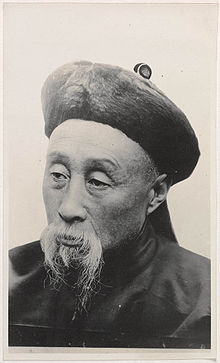Zhao Erfeng
| Zhao Erfeng | |
|---|---|

Zhao Erfeng
|
|
| Amban | |
|
In office 1908–1911 |
|
| Personal details | |
| Born | 1845 |
| Died | 1911 Sichuan |
| Nationality | Han chinese Bannerman |
| Military service | |
| Allegiance |
|
| Unit | Eight Banners |
| Battles/wars | 1905 Tibetan Rebellion, 1911 Tibetan Rebellion, Xinhai Revolution |
| Zhao Erfeng | |||||||||
| Traditional Chinese | 趙爾豊 | ||||||||
|---|---|---|---|---|---|---|---|---|---|
| Simplified Chinese | 赵尔豊 | ||||||||
|
|||||||||
| Jihe (courtesy name) |
|||||||||
| Chinese | 季和 | ||||||||
|
|||||||||
| Transcriptions | |
|---|---|
| Standard Mandarin | |
| Hanyu Pinyin | Zhào Ěrfēng |
| Wade–Giles | Chao Erh-feng |
| Transcriptions | |
|---|---|
| Standard Mandarin | |
| Hanyu Pinyin | Jìhé |
| Wade–Giles | Chi-ho |
Zhao Erfeng (1845–1911), courtesy name Jihe, was a Qing Dynasty official and Chinese bannerman, who belonged to the Plain Blue Banner. He is known for being the last amban in Tibet, appointed in March, 1908. Lien Yu, a Manchu, was appointed as the other amban. Formerly Director-General of the Sichuan - Hubei Railway and acting viceroy of Sichuan province, he was the much-maligned Chinese general of the late imperial era who led military campaigns throughout Kham (eastern Tibet) and eventually reaching Lhasa in 1910, thus earning himself the nickname "Zhao the Butcher".
Zhao Erfeng crushed the Tibetan Lamas and their monasteries in the 1905 Tibetan Rebellion in Yunnan and Sichuan, crushing the rebels at the siege of Chantreng which lasted from 1905 to 1906. The Tibetan Lamas had revolted against Qing rule, killing Chinese officials, western Catholic Christian missionaries and native Christian converts, since the Tibetan Buddhist Gelug Yellow Hat sect was suspicious of the Christian missionary success.
Zhao Erfeng extended Chinese rule into Eastern Tibet (Kham), and was appointed Amban in 1908 - the last man to hold that position. Initially he worked with the Dalai Lama, who had returned after fleeing from the British invasion of 1903-1904. But in 1909, they disagreed strongly and Zhao Erfeng drove the Dalai Lama into exile. A former Tibetan Khampa soldier named Aten recounted Tibetan memories of Zhao, calling him "Butcher Feng", claiming that he: razed Batang monastery, ordered holy texts to be used by troops as shoeliners, and mass murdered Tibetans.
The Dalai Lama was installed at the palace and monastery of Potala amid popular demonstrations. The ruler, who was again given civil power at the head of their hierarchy, pardoned all the Tibetans who had given the oath to Colonel Younghusband. Things went well for a month until the lama protested to the Chinese in charge of military affairs because of the excesses of the Chinese troops on the Sichuan frontier, where they were sacking the monasteries and killing the monks. This protest served to stir up the whole question of the status of Tibet. The Amban declared that it was a Chinese province, and said he would deal with the rebels as it pleased him to do. Other questions of authority arose, and finally the Amban sent orders to 500 Chinese troops who were encamped on the outskirts of the capital, Lhasa. A few companies composed of the Dalai Lama's followers were hastily enrolled under the name of 'golden soldiers'. They tried to resist the Chinese soldiers, but, being poorly armed, were quickly overwhelmed. Meanwhile, the Dalai Lama, with three of his ministers and sixty retainers, fled through a gate at the rear of the palace enclosure, and were fired upon as they escaped through the city.
...
Wikipedia
